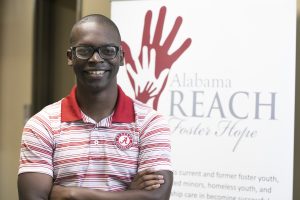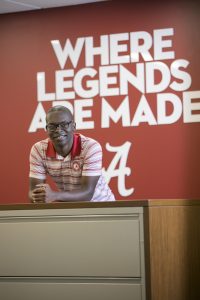Creative media major overcomes fear of social stigma, becomes champion of program

Timothy Skipper is a magnet. His chilled demeanor, soft voice and ready smile help him navigate any room he’s in.
His eloquence, artistry and public speaking prowess have prepared him for a world in TV and film when he graduates from The University of Alabama in December with a degree in creative media.
Skipper, though, was unusually guarded when he arrived on campus for his freshman year in 2015. Life experiences, including an alternative living arrangement, had left him vulnerable.
UA’s support office for foster and homeless youth, Alabama REACH, even had trouble connecting with Skipper after an initial meeting in fall 2015.
“A lot of that is due to the fear of the unknown and exposing yourself, and being seen as some type of ‘other’ because you’re not the ‘known’ here on campus,” Skipper said. “You feel like an outsider and assume there aren’t resources that are available to you.”
REACH program coordinator Shannon Hubbard did her best to sell Skipper on the program, highlighting REACH’s student pantry, emergency fund and financial aid. Hubbard’s persistence eventually sold Skipper on REACH after his first year on campus.
Now, Skipper is an ambassador for the program and is tasked with connecting other eligible students to REACH. He’s served as a keynote speaker for the program during campus events and helped the office in its rebranding and marketing efforts.
“[Hubbard] has become such a great mentor to me,” Skipper said. “It was her time, attention and advice that got me into the program. She saw something in me that I didn’t see in myself. She’s opened doors for me that I wouldn’t have done on my own.”
A platform for change
Skipper, a native of Abbeville, grew up in a “poverty-stricken, abusive” home with his older sister and three younger brothers. When he was in sixth grade, he and his siblings were placed with his grandmother in a kinship guardianship, a form of alternative living, which helped him qualify for support from Alabama REACH.

“Those few years of my life are kind of a blur,” Skipper said.
His experiences are relatable, though, as most of the students affiliated with Alabama REACH were previously in kinship guardianship, he said. He’s since been able to connect with these students through REACH socials, and two of his roommates, Dakota Franklin and Jemarcus Lewis, are UA students affiliated with the program.
“REACH is definitely very much a necessity here on campus for giving outsiders a sense of community and family,” Skipper said. “It’s like any friendship, but it’s a familial bond. We’ll talk about school, but we connect on a deeper level due to things we’ve both experienced in the past. It’s cathartic to talk and vent with people who have had similar experiences. That’s important on a huge campus, especially being from a niche demographic.”
Hubbard said 38 UA students are active with REACH. However, nearly 900 other students on campus are eligible to participate, but they either don’t know about the program, or fear being stigmatized if they reveal previous foster care or guardianship status.
REACH recently worked with UA’s admissions office to change how guardian/parent-related questions are worded on admissions materials in an effort to reach a broader base of students.
Also, UA’s Capstone Agency, a student-run communications firm, has worked with Skipper to create new marketing materials, including photos and videos, for print and social media.
“We didn’t want to use any offensive language or terms that could possibly alienate people that qualify for REACH,” Skipper said. “We wanted to make sure that the requirements to become a REACH student were understandable. You have so many demographics, from homeless to orphan or kinship care, and there’s so much jargon to work your way through. We had to make it understandable and concise. We wanted the messaging to empower.”
